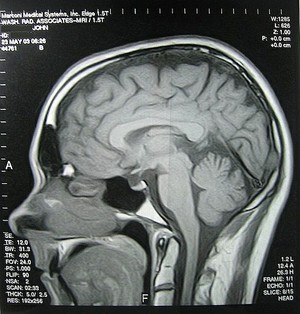An ultimate and tragic consequence of years of alcoholic drinking, wet brain (Wernicke-Korsakoff syndrome) occurs from a thiamine deficiency due to malnutrition. In early stages, the syndrome can be partially reversed through treatment with large doses of thiamine; in late stage cases, there is no effective treatment (read more about how daily thiamine may help heavy drinkers prevent wet brain.)
Alcoholics become deficient in thiamine (vitamin b-1) through poor eating habits (liquid meals), damaged gastro intestinal systems that do not absorb nutrients well, and through liver damage (leading to a reduction in thiamine processing). Thiamine is an essential nutrient for glucose conversion in the brain, and over time, a thiamine deficiency leads to significant brain cell death and serious structural damage in certain areas of the brain. Areas of the brain most affected include the brain stem, the cerebral cortex and the pons.
Symptoms of Wet Brain
- Ataxia, an irregular gait – wide stance and short step
- Confusion, which often manifests as apathy to external surroundings and low voluntary verbal participation
- Confabulation – telling of events that did not happen, and believing them to be true
- Dementia
- Hallucination – visual, aural or tactile
- Loss of control over eye movements
Treatment for Wet Brain
Patients suffering early stages of wet brain may respond well to large doses of intravenous thiamine, and may see a substantial symptoms improvement. Late stage patients will not benefit from any known treatment.
The mortality rate for wet brain is about 20%. Prompt treatment will lead to a full mental recovery for about 20%, a recovery from ataxia for about 40% and a recovery from irregular eye movement for about 60%.
Most patients suffering from wet brain have abused alcohol heavily for many years. The rate of occurrence in the general population is not known, but it is higher amongst certain subsets, such as the homeless and the elderly.
Anyone concerned about symptoms indicative of wet brain needs immediate medical attention.
Continue Reading:
Even Brain Damaged Alcoholics Can Expect Neural Recovery with Prolonged Sobriety
Page last updated Feb 15, 2014


